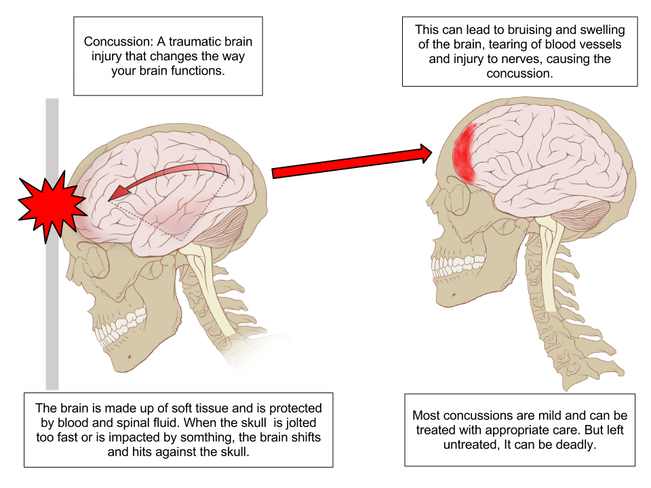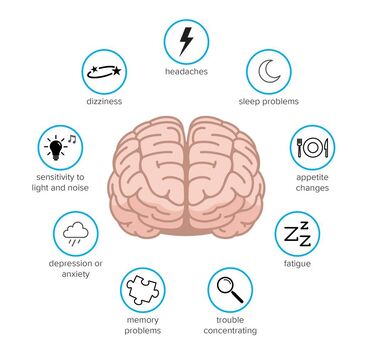Post Traumatic Concussion
|
SIX CLINICAL CATEGORIES
|
CAUSES & MECHANISMS OF INJURY

Concussion injuries are heterogenous, multi-faceted injuries, which have uniquely individual presentations (1). There is a broad consensus among experts that a one-size-fits-all approach to post-concussion management is ineffective (11). Concussion, also known as mild traumatic brain injury, is a common, sometimes debilitating condition that reflects impairment of brain function (4). A mild traumatic brain injury can be caused by a direct or indirect hit, or force to the head or body, which can induce a range of symptoms, that vary in duration, severity, and number between individuals (5).
10%-33% of patients may remain symptomatic for months to years after the initial injury(10).
After concussion, two of the most commonly reported symptoms are headache and dizziness, followed closely by nausea and neck pain. The majority of symptoms resolve in 7-10 days, but in approximately 30% of athletes they persist. Cervical spine trauma may cause prolonged post concussion headaches. The upper cervical spine may cause cervicogenic headaches. Dizziness and balance dysfunction are also commonly reported symptoms following sport related concussion and may be due to dysfunction of the vestibular, proprioceptive or central systems (8).
For some individuals, Post Concussion Syndrome, or PCS will occur and cause symptoms for months to years if not rehabilitated properly. Since Concussion is defined as a complex physiological process affecting the brain, induced by biomechanical forces (2), it is difficult to determine who will experience PCS. Although factors can help determine longevity, such as the presence of certain presenting symptoms. Post Concussion headache has been reported as a predictor of longer time loss (7)
Proper orientation in space requires accurate and consistent input from the proprioceptive, visual and vestibular systems. If one or more of these systems provide inaccurate information about spatial location, alteration in balance and dizziness may result due to mismatching of sensory information. Dysfunction of these systems may persist and may alter risk for future concussion (8).
In the case of persistent dizziness, neck pain and/or headaches with suspected cervical or vestibular causes, treatment of the affected systems may facilitate functional and symptomatic improvements and shorten recovery (9)
Treatments include Chiropractic adjustments to restore function of the proprioceptive system, Cervicovestibular rehabilitation, Neurological rehabilitation (Neuroplasticity exercises) to reconnect and re-establish normal pathways of brain signaling that become disrupted due to axonal injury associated with mTBI (concussion), Gait protocol and Low intensity aerobic exercise.
10%-33% of patients may remain symptomatic for months to years after the initial injury(10).
After concussion, two of the most commonly reported symptoms are headache and dizziness, followed closely by nausea and neck pain. The majority of symptoms resolve in 7-10 days, but in approximately 30% of athletes they persist. Cervical spine trauma may cause prolonged post concussion headaches. The upper cervical spine may cause cervicogenic headaches. Dizziness and balance dysfunction are also commonly reported symptoms following sport related concussion and may be due to dysfunction of the vestibular, proprioceptive or central systems (8).
For some individuals, Post Concussion Syndrome, or PCS will occur and cause symptoms for months to years if not rehabilitated properly. Since Concussion is defined as a complex physiological process affecting the brain, induced by biomechanical forces (2), it is difficult to determine who will experience PCS. Although factors can help determine longevity, such as the presence of certain presenting symptoms. Post Concussion headache has been reported as a predictor of longer time loss (7)
Proper orientation in space requires accurate and consistent input from the proprioceptive, visual and vestibular systems. If one or more of these systems provide inaccurate information about spatial location, alteration in balance and dizziness may result due to mismatching of sensory information. Dysfunction of these systems may persist and may alter risk for future concussion (8).
In the case of persistent dizziness, neck pain and/or headaches with suspected cervical or vestibular causes, treatment of the affected systems may facilitate functional and symptomatic improvements and shorten recovery (9)
Treatments include Chiropractic adjustments to restore function of the proprioceptive system, Cervicovestibular rehabilitation, Neurological rehabilitation (Neuroplasticity exercises) to reconnect and re-establish normal pathways of brain signaling that become disrupted due to axonal injury associated with mTBI (concussion), Gait protocol and Low intensity aerobic exercise.
SIGNS & SYMPTOMS
|
|

